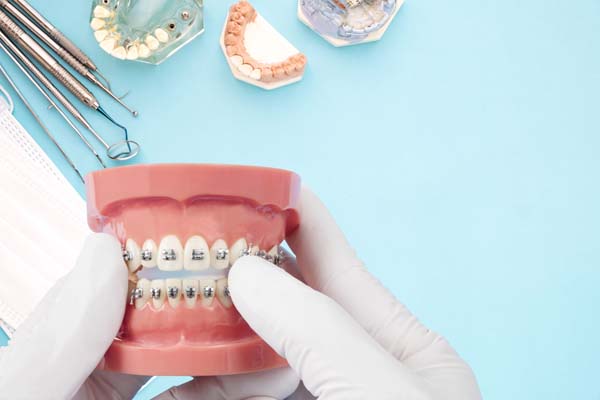Pros and Cons of Braces for Orthodontics

Braces have been used for orthodontics for over a century. They move teeth by applying force on them, slowly pushing them to a better alignment. Braces are made up of brackets that are attached to each tooth and wires that connect all the brackets on a dental arch. Increasing tension in these wires increases the force being applied to the patient’s teeth. Pushing teeth to a better alignment is the idea that powers orthodontics.
About braces
Braces are highly recommended by dentists when it comes to fixing severe bite issues. Treatment times are typically somewhere between one to three years. Braces are easily noticed when worn, however, and that makes some people reluctant to straighten their teeth with them.
Fortunately, more aesthetically pleasing options like ceramic braces have been developed. Ceramic braces have similar parts as metal braces, but the metallic components are replaced with transparent and tooth-colored parts. As a result, it is harder to notice them on teeth.
Pros and cons of orthodontics with braces
Most people think of braces when orthodontics is mentioned. The benefits of straightening teeth with braces include:
- Traditional braces can be used to treat a wider range of orthodontic issues than clear aligners, such as problems caused by a person’s jaw being improperly positioned
- Braces tend to lead to better outcomes compared to clear aligners
- Braces are typically more affordable than clear aligners
- Braces work 24/7, and that can lead to shorter treatment times
- Braces being non-removable can be a plus for the parents of children who need orthodontic treatment
- There is no way that a person can lose their braces
- Braces are more effective at straightening children’s teeth
- Ceramic braces provide decent aesthetics
- Braces are sturdier than clear aligners
However, there are downsides to fixing bite issues with braces. The most common ones include:
- Metal braces can ruin a person's smile
- People who wear braces often must avoid foods that need to be bitten into, like apples or corn, since this can lead to food particles getting stuck underneath the appliance or cause damage
- Braces being non-removable makes it harder to clean teeth and eat during treatment
- Treatment with braces typically requires monthly visits to a dentist
- Braces are more challenging to clean than clear aligners
Braces can get you a straight smile
Braces might not be the most aesthetically pleasing oral appliances used to straighten teeth, but they get the job done. Call or visit our Chicago clinic to learn more about how oral appliances like braces can be used to fix problems with your bite.
Request an appointment here: https://www.yourfamilysmiles.com or call Family Dental Care of Chicago at (773) 250-1194 for an appointment in our Chicago office.
Check out what others are saying about our dental services on Yelp: Orthodontics in Chicago, IL.
Recent Posts
Dental veneers allow individuals with cosmetic imperfections and abnormalities to improve their teeth, which leads to an enhanced smile. They have become one of the most popular treatment options, as the procedure is relatively straightforward with little to no discomfort. Additionally, veneers are long-lasting and look very natural, thus making it difficult to detect the…
Teeth whitening can help you achieve a brighter smile. However, maintaining it requires diligent aftercare. Teeth whitening can provide noticeable results, but without proper care, the effects may be short-lived and fade prematurely. The following simple steps can help keep your teeth shining while protecting the investment you made in professional whitening treatment.Consistent oral hygiene…
For dental emergencies, people can go to an emergency dentist or an emergency room. However, several things should be considered before deciding where to seek medical help. Just like any other medical emergency, dental emergencies also require different levels of care. This depends on their severity. The ideal place to go for treatment when you…
Wondering if you should choose dental implants to replace your missing teeth? Even if you are just missing one of your teeth, you need to find a tooth replacement option as soon as possible. A healthy mouth is one that has a full set of teeth so the sooner you find a replacement option that…


